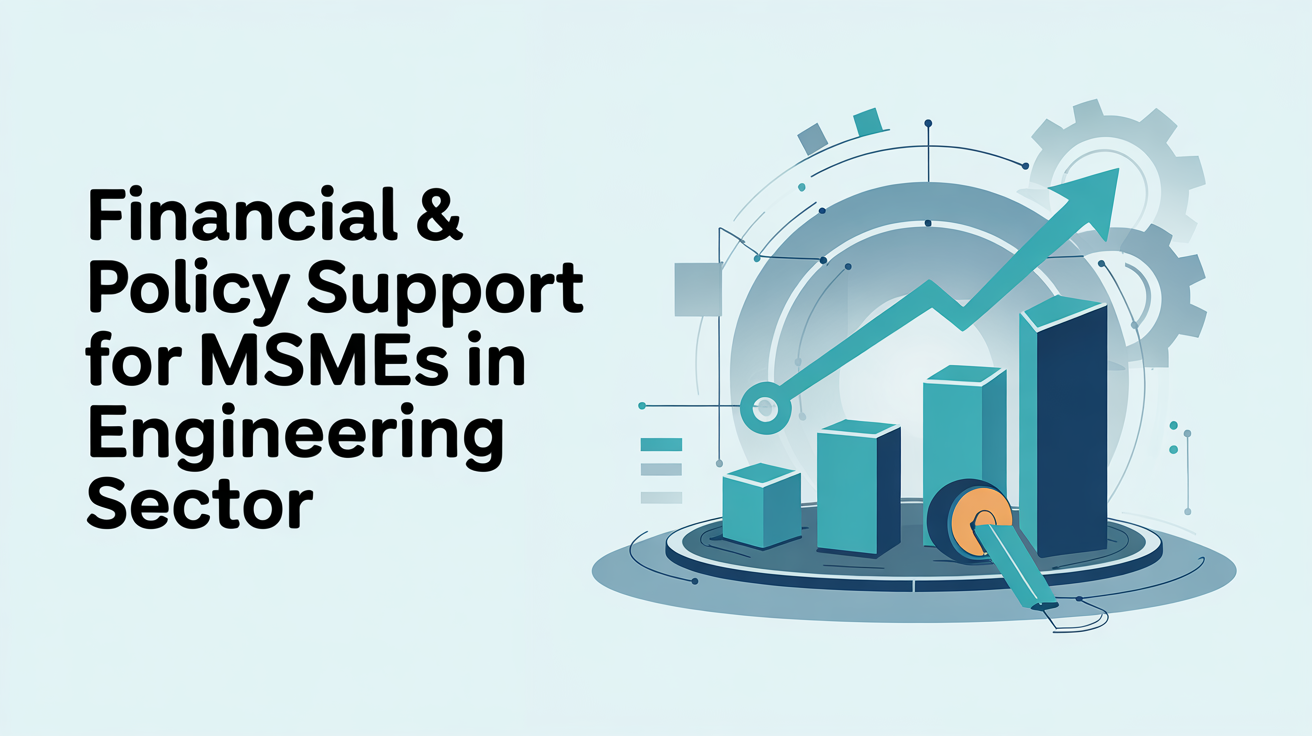
For a long time now, engineering has been the backbone of industrial evolution and export growth in India. Specific to that, more than 95% of the engineering units in India are MSMEs, and these have played an irreplaceable role in terms of innovations, employment, and foreign exchange through exports. However, with the increasing global trade uncertainties, major economies such as the U.S. making policy shifts, and the regulators changing their landscape from time to time, the call for solid finances and policy measures for MSMEs in this sector has never been louder than now.
Why MSMEs Matter Engineering
For nearly 40% of engineering in India, MSMEs generate exports. Machines, auto components, medical instruments, and renewable energy equipment are some of the industrial machineries produced. However, such enterprises usually suffer challenges such as funds bottlenecks, limited market access, and high compliance burdens. Institutional support and proactive policies play a significant role in overcoming these hurdles.
EEPC India Empowering MSMEs
The Engineering Export Promotion Council (EEPC) of India – a premier trade and investment promotion organization – has been instrumental in carrying out the above efforts through MS’s reputed trade delegations, exhibitions, and, most importantly, voicing MSME issues across the policy corridors.
Key Policy & Regulatory Changes in 2025
1. Rationalization of FEMA Guidelines by RBI
The Reserve Bank of India (RBI) has proposed sweeping changes to the Foreign Exchange Management Act (FEMA) regulations to simplify cross-border trade for MSMEs:
| Policy Element | Earlier Framework | Proposed Change |
| Export Realization Period | 15 months (for warehousing abroad) | Reduced to 9 months |
| Export Declaration | Multiple Forms | Unified Export Declaration Form (EDF) |
| Self-Write-off | Allowed for status holders | Discontinued |
| Bank Discretion | Limited | Expanded with internal board-approved policies |
These changes are aimed at reducing red tape and empowering banks to act as facilitators rather than mere compliance agents. MSMEs now need to align with banks’ internal policies for export-import documentation, settlements, and dispute resolutions.
2. Market Diversification & Global Presence
With protectionist policies like the U.S. Section 232 Tariffs returning in 2025, MSMEs must actively explore alternative markets. EEPC India is facilitating Indian MSMEs’ participation in global expos like Hannover Messe (Germany), Middle East Energy (Dubai), and more.
Want to start exporting your engineering products? Visit: www.entrepreneurindia.co
3. Financial Support Mechanisms
- Credit Guarantee Scheme:
Government-backed credit guarantee through CGTMSE ensures collateral-free credit to MSMEs up to ₹5 crores.
- Interest Subvention Schemes:
Engineering MSMEs are eligible for 3-5% interest subvention under various export-linked schemes.
- Trade Receivables Discounting System (TReDS):
TReDS platforms allow MSMEs to discount their invoices and receive faster payments from large buyers and PSUs.
4. Impact of U.S. Section 232 Tariffs
- India’s engineering exports to the U.S. are facing new challenges due to tariff hikes. Here’s a snapshot:
- India’s steel and aluminium exports to the USA dropped 27% and 25.6% respectively in 2023 due to tariff hikes (Source: EEPC India)
- This necessitates urgent diplomatic negotiations for exclusions and diversification to newer markets.
5. Digital Transformation & Ease of Doing Business
RBI’s shift toward digitized trade and the introduction of eCoO 2.0 (Electronic Certificate of Origin) aims to empower MSMEs digitally. The unified export-import documentation under FEMA will bring goods and services on equal footing, reducing costs and delays for MSMEs.
At NPCS, We Make MSME Dreams Come True
For more than thirty years, Niir Project Consultancy Services (NPCS) has been at the forefront of enabling startups and entrepreneurs. For the establishment of new sectors or businesses, we offer Market Surveys combined with Detailed Techno-Economic Feasibility Reports (DPRs). Our DPRs include:
- ✅ Manufacturing Process
- ✅ Market Research & Demand Forecast
- ✅ Flow Sheet Diagram
- ✅ Product Mix
- ✅ Machinery & Raw Material Details
- ✅ Complete Project Financials
- ✅ Break-even, ROI & Risk Assessment
Whether you’re planning to set up a steel fabrication unit or renewable energy equipment plant, NPCS can be your knowledge partner.
➡️ Visit: https://www.niir.org
➡️ Check latest blogs: https://www.niir.org/blog/
Subscribe on YouTube: NIIR Project Consultancy Channel
Suggested Reads for MSME Entrepreneurs
Learn more from our blog section:
- https://www.niir.org/blog/revised-msme-definition-a-game-changer-for-entrepreneurs/
- List of 55 Profitable Business Ideas for Micro Small and Medium Enterprises (MSME) – Niir Project Consultancy Services
- https://npcsblog.com/49-profitable-msme-manufacturing-business-ideas-upto-rs-80-lakhs-for-new-entrepreneurs
Conclusion
India’s MSME engineering sector stands at a critical juncture. With proactive policy reforms, evolving financial support structures, and market access initiatives driven by EEPC India and the Government of India, the road ahead is promising. However, timely adoption, awareness, and expert guidance are key.
Need a business idea or industry analysis? Visit https://npcsblog.com or https://www.entrepreneurindia.co/blogs
Let us build the future of Indian engineering exports together—resilient, competitive, and truly global.





